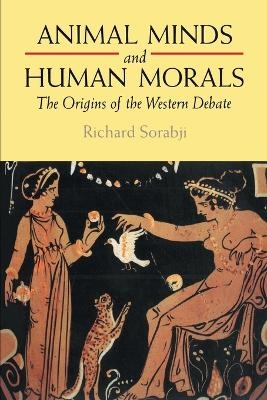
Animal Minds and Human Morals
The Origins of the Western Debate
Seiten
1996
|
New edition
Bristol Classical Press (Verlag)
978-0-7156-2728-0 (ISBN)
Bristol Classical Press (Verlag)
978-0-7156-2728-0 (ISBN)
A look at the history of ideas about ethical treatment of animals. The Stoics denied animals reason and belief, but this would mean that perception, emotion, intention, moral responsibility, memory, and speech would need to be redefined. Sorabji argues that a broader view of ethics is required.
"Animals can't construct sentences. Therefore we can eat them." That was the view the Stoics eventually settled for, though they began with Aristotle's much broader claim that animals lack reason. In this book, the author argues that the Western tradition has been rather complacent. St Augustine incorporated the Stoic view into Christianity, but in doing so he took up only half the ancient debate, for there were many philosophers who defended animals. The controversy affected the whole of the philosophy of mind, because if animals are denied reason and belief, we have to redefine not only reason and belief, but perception, emotion, intention, moral responsibility, memory, speech and the power to conceptualize. Sorabji argues that a broader view of ethics is needed than is found either in the ancient opponents of animals, or in their modern defenders.
"Animals can't construct sentences. Therefore we can eat them." That was the view the Stoics eventually settled for, though they began with Aristotle's much broader claim that animals lack reason. In this book, the author argues that the Western tradition has been rather complacent. St Augustine incorporated the Stoic view into Christianity, but in doing so he took up only half the ancient debate, for there were many philosophers who defended animals. The controversy affected the whole of the philosophy of mind, because if animals are denied reason and belief, we have to redefine not only reason and belief, but perception, emotion, intention, moral responsibility, memory, speech and the power to conceptualize. Sorabji argues that a broader view of ethics is needed than is found either in the ancient opponents of animals, or in their modern defenders.
| Erscheint lt. Verlag | 31.10.1996 |
|---|---|
| Zusatzinfo | black & white illustrations |
| Verlagsort | London |
| Sprache | englisch |
| Maße | 156 x 234 mm |
| Gewicht | 391 g |
| Themenwelt | Geisteswissenschaften ► Philosophie ► Ethik |
| Geisteswissenschaften ► Philosophie ► Philosophie Altertum / Antike | |
| Sozialwissenschaften ► Soziologie | |
| ISBN-10 | 0-7156-2728-7 / 0715627287 |
| ISBN-13 | 978-0-7156-2728-0 / 9780715627280 |
| Zustand | Neuware |
| Haben Sie eine Frage zum Produkt? |
Mehr entdecken
aus dem Bereich
aus dem Bereich
Buch | Hardcover (2012)
Westermann Schulbuchverlag
34,95 €
Schulbuch Klassen 7/8 (G9)
Buch | Hardcover (2015)
Klett (Verlag)
30,50 €
Buch | Softcover (2004)
Cornelsen Verlag
25,25 €


